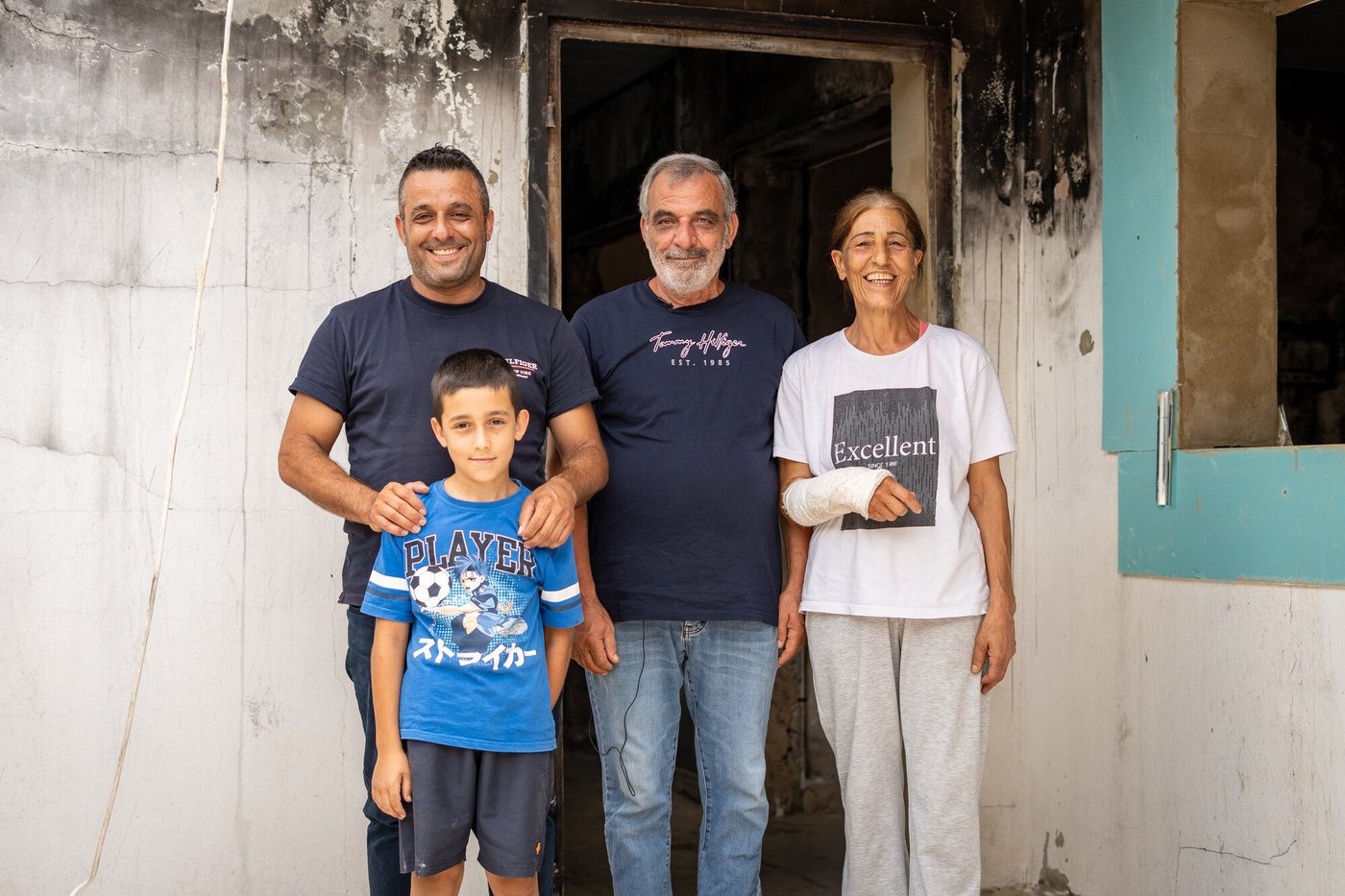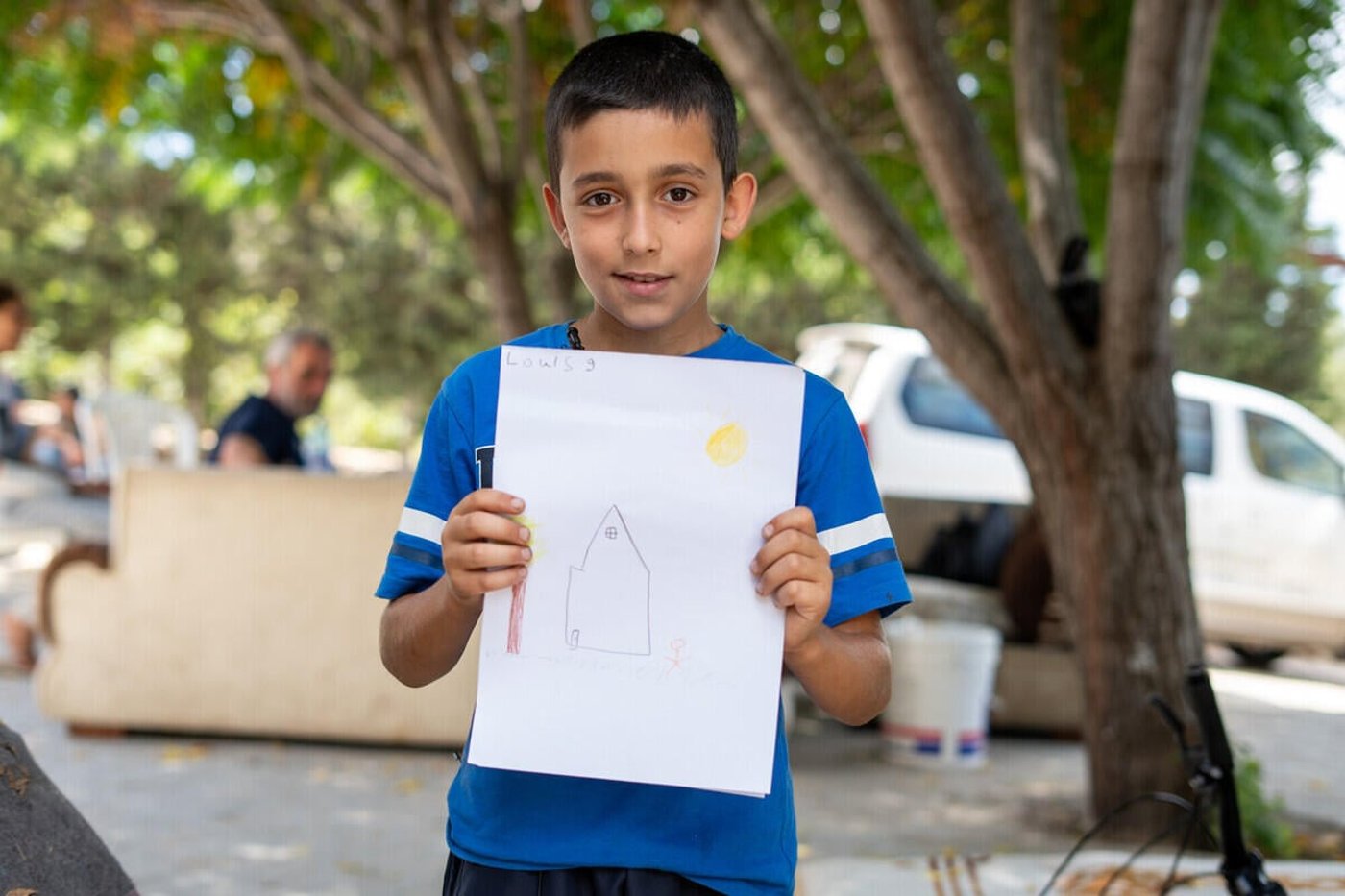In Lebanon, displaced families have begun to return to their villages. But many are finding their homes in ruins, destroyed by the recent war.
Nine-year-old Louis is one such person. Two years ago, in October 2023, his family’s lives changed dramatically when Israeli forces attacked their village. Louis and his grandparents had to flee. His father, Edmond, stayed behind to look after the house and the animals. In September 2024, when the hostilities escalated, a grenade landed in the family’s garden, close to Edmond, and he decided to leave too.
Before withdrawing from the village following the November 2024 ceasefire, Israeli soldiers set fire to several houses, including Louis’s. When the family returned this summer, they found their home severely damaged.
Now, with support from the Norwegian Refugee Council (NRC), the family has begun the hard work of repairing their home. For now, all four family members sleep in the one bedroom that’s been renovated.

In 2024, NRC helped more than 1.4 million people around the world to get a roof over their heads.
Louis is happy to be back in the village where he grew up. “But I miss our livestock, which disappeared during the attacks. I also miss my toys, which are gone,” he says.
NRC has provided water and repaired damaged infrastructure in the village, and life is slowly beginning to return. Grandfather Elyas is grateful for all the help the family has received, even though their home is still far from fully renovated.
“Winter is coming, and if the doors and windows aren’t fixed, we’ll have a problem. But the most important thing is that we can live together as a family in our own home,” he says. “Home is family, home is love.”
This is what a home means for a family forced to flee:
#1: It can increase your chances of earning an income
After people have fled war or persecution, the opportunity to work and earn money is one of the most effective ways for them to rebuild their lives.
Without a proper home, it is very difficult or impossible for displaced families to find paid work. Many live in camps or informal settlements far from towns and markets and can’t afford to travel. Others lack the documents required to work legally. But if you have a home, you have stability and a better chance of getting a job.
#2: It’s easier to send your children to school
Loss of income means that many parents can’t afford to send their children to school. Without a good home, it is hard for children to concentrate on their schoolwork and homework. Today, 234 million crisis-affected children need education support, and 85 million of them are out of school completely.
During conflict, schools are often destroyed or become unsafe because they are used for military purposes. During displacement crisis, schools are also used as shelters by displaced people.
#3: You get better access to health services
Without a proper home, it is difficult for people to access health care and other public services. Many displaced people live in camps or informal settlements with limited or no access to health services. Others lack identity papers or other important documents required to access health care and other services.
A 2020 report on the wider impacts of humanitarian shelter and settlements assistance shows that poor shelter can increase health risks, and that housing deprivation increases the risk of disability or severe ill health over the course of life by 25 per cent.
#4: A home helps to protect children
A good home provides protection. Children are less at risk of violence and sexual abuse. They are less likely to be forced into child labour, married off at a young age or forcibly recruited by armed groups.
#5: You get better access to humanitarian aid
A home ensures that displaced people have better access to humanitarian aid. It is easier for people with a home to seek help from the authorities and organisations that provide aid. And, it is easier for humanitarian aid organisations to reach out with the help people need.
#6: A home reduces mental stress
A safe home reduces the risk of developing mental stress. Many displaced children struggle with trauma caused by conflict. Without school and a stable living environment, these children’s condition can worsen, and they can miss out on opportunities to receive help.
Even the most basic shelter and settlements assistance can contribute to a sense of normalcy for conflict- and disaster-affected communities.
#7: It’s easier to be included and integrated
Although most displaced families want to return to their original homes, figures show that many have been displaced for years. By mid-2024, 66 per cent of the world's refugees had been displaced for more than five years, according to figures from the World Bank.
Having a home increases the opportunity for displaced families to establish strong social, economic and cultural ties with their host community. When people are included and integrated into the local community, they are more able to rebuild their lives and live in a dignified way.
In 2024, NRC helped more than 1.4 million people around the world to get a roof over their heads.
|
The right to adequate housing International human rights law “recognizes everyone’s right to an adequate standard of living, including adequate housing”. UN guidance states: “People on the move, whether they are refugees, asylum-seekers, internally displaced persons (IDPs) or migrants, are particularly vulnerable to a range of human rights violations, including violations of the right to adequate housing. Displaced persons are also particularly vulnerable to discrimination, racism and xenophobia, which can further interfere with their ability to secure sustainable and adequate living conditions.” Read more here. |


